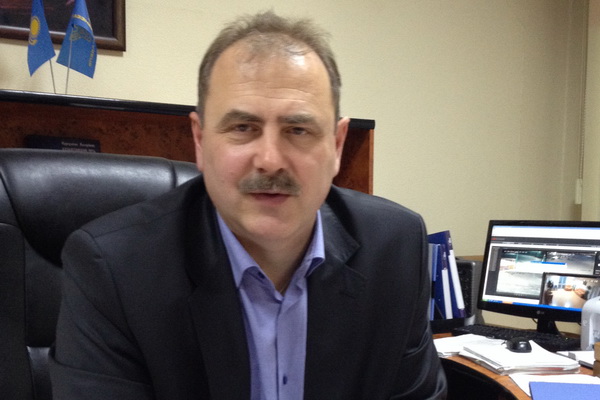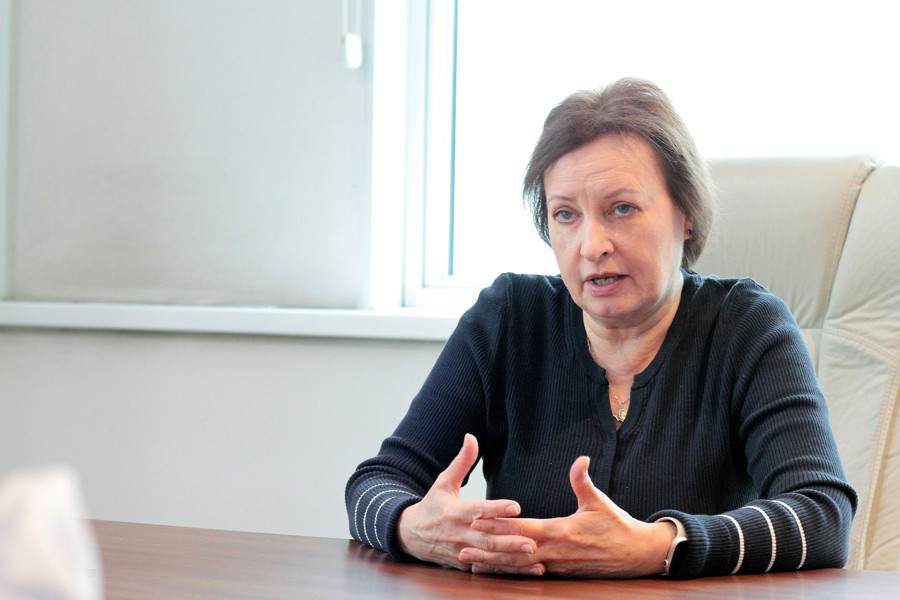General Director of KazEnergoKabel JSC Oleg KRUK:
BUSINESS NEEDS "A SAFETY CUSHION" TO SUPPORT NORMAL OPERATION

The beginning of the year is the time when the companies publish the results of the previous year and announce plans for the next year. However, in the current economic situation the businesses are more concerned about keeping their staff and maintaining the normal operation. Oleg KRUK, the general director of Pavlodar-based KazEnergoKabel JSC, told Interfax-Kazakhstan in an interview what challenges his company will have to face this year.
- Last year was a difficult one. It began with the devaluation of the ruble, as the result of which our neighbors received considerable price advantages and literally collapsed the Kazakh market. As you remember, a lot of Russian goods were imported to Kazakhstan. People were buying everything: cars, apartments, home appliances and even food. All this had negative impact on all businesses, including our company. The Russian producers also imported cheap cable to Kazakhstan. We could not possibly keep up with our neighbors in terms of price, because our cable prices are pegged to the dollar.
- You use Kazakhstani raw materials, don’t you?
-You're right. The biggest component in the cost of our cable products is the metal used for cable production: copper or aluminum. Both copper and aluminum are made in Kazakhstan and we pay for them in tenge. However, the actual price we pay is formed in dollars, on the basis of the London Metal Exchange prices that are later converted into tenge at the exchange rate on the day of delivery. This is stipulated in the contracts. We also buy materials in Europe and China, and pay in foreign currency for them. With the Kazakh content ranging from 70% to 100%, we nevertheless depend on the dollar exchange rate.
- All right, let's go back to the results of the year. What are they?
- The final figures are being calculated and will be announced after the audit. I do hope that we made profit last year, but I do not rule out the "negative" result either. However, the currency difference, which was the result of the high volatility of our currency in the past year, could play a nasty trick. Last year’s results may happen to be “positive” in terms of physical output but "negative” in monetary terms. However, I am more concerned about this year rather than the last year. Due to the shutdown of a large number of projects, both public and private, the demand for goods, the production of which requires investment, has significantly reduced. This also includes cable products. There are virtually no orders today. Today we mainly work with the contractors of the Nurly Zhol program. However, there is some difficulty here too. The project was developed a few years ago and its cost was estimated at the same time. Of course, no one could have foreseen such a significant change in the exchange rate and, consequently, the cost of materials. The estimated cost could not be revised upward. Therefore, we cannot work at the old prices, and the customers at the current prices.
- Oleg Pavlovich, but there is a good chance to participate in the EXPO, which involves a large amount of construction.
- There have been only one-time orders so far. We have been conducting negotiations for almost a year and a half. There has been a considerable progress; the contractors are now starting to work with domestic producers. But it is too early to jump at conclusions as the negotiations are still underway. Let's wait and we will see.
- Well, what about your second product - aluminum rod?
- It is too early to say something for certain. It is just the beginning of the year. It is now important for us to keep the employees. I shudder to think about stuff reduction, because we won’t be able to find such specialists in the future. We expect the market to recover in spring. It is not going to be an easy year and we already know it. Our main competitor, Rusal, has taken a number of significant measures to attract more customers both in Russia and Uzbekistan. And we mainly export our aluminum rod to these two countries.
- And what about Kazakhstan?
- There are another two producers in Kazakhstan: one in Taldykorgan, and the other, quite a new company, in Shymkent. If they speed up, they will become serious competitors for us.
- Is there any advantage that you buy feedstock from domestic suppliers?
- Not very much. Of course, our costs on transportation of the feedstock, which is aluminum ingots, are considerably lower. But the consumers of aluminum rod are mainly in south Kazakhstan and Uzbekistan, which gives advantage in terms of transportation to our southern competitors. But we have been working in this market for six years already or longer than anyone else. It means that we have more experience.
- Oleg Pavlovich, last year you had some problems with the feedstock supplier. Have they been resolved to date?
- The problem is not with a particular supplier, but the whole feedstock chain.
-What do you mean?
Last year we had disagreement about the volume of feedstock supply. Today we have a different problem when we have to buy the feedstock on a prepaid basis. It takes a lot of time to produce and receive money from our consumers. Here is how it works: we pay our feedstock supplier, then it takes seven to ten days to get the feedstock delivered, then another two weeks for us to produce rods and another month to produce cable products, it then usually takes two weeks to deliver the finished products to the buyer and about 30 to 60 days for the buyer to make the payment. Our customers usually do not agree to prepayment for their own reasons. Construction and installation companies cannot give a prepayment either because they receive payment only after their projects are complete. The most interesting thing is that our suppliers of feedstock are our consumers of cable products at the same time.
In order to support normal operation of the company, we need to have a "safety cushion" worth of billions of tenge to support the operations during these three months. Of course, we could borrow the money from the bank to finance the working capital, but the problem is that the banks mainly offer loans in dollars or rubles, nearly never in tenge.
I suggest that prepayment should be allowed in government procurement, and also by Samruk-Kazyna and mineral resource companies. Deferred payment for the feedstock could be another option. In this case, the government could provide guarantees for those companies that have been operating on the market long enough. Also, the producers could be offered credit lines. Anyway, the government should come up with a solution to the problem that is so crucial not only to our company but the whole business community.
-Thank you for the interview.
February, 2016
© 2026 Interfax-Kazakhstan news agency
Copying and use of these materials without reference to the source is prohibited
Archive





